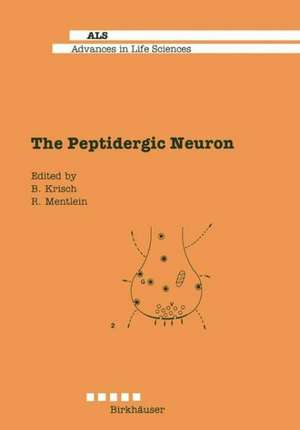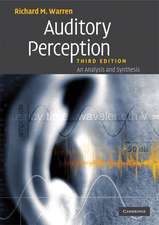The Peptidergic Neuron: Advances in Life Sciences
Editat de B. Krischen Limba Engleză Paperback – 9 oct 2011
Din seria Advances in Life Sciences
- 15%
 Preț: 646.11 lei
Preț: 646.11 lei - 15%
 Preț: 645.96 lei
Preț: 645.96 lei - 15%
 Preț: 650.86 lei
Preț: 650.86 lei - 5%
 Preț: 365.99 lei
Preț: 365.99 lei -
 Preț: 417.02 lei
Preț: 417.02 lei -
 Preț: 394.51 lei
Preț: 394.51 lei -
 Preț: 387.20 lei
Preț: 387.20 lei -
 Preț: 391.02 lei
Preț: 391.02 lei -
 Preț: 405.87 lei
Preț: 405.87 lei -
 Preț: 389.70 lei
Preț: 389.70 lei -
 Preț: 400.26 lei
Preț: 400.26 lei -
 Preț: 399.88 lei
Preț: 399.88 lei -
 Preț: 396.62 lei
Preț: 396.62 lei -
 Preț: 398.15 lei
Preț: 398.15 lei -
 Preț: 409.69 lei
Preț: 409.69 lei -
 Preț: 395.47 lei
Preț: 395.47 lei -
 Preț: 390.25 lei
Preț: 390.25 lei -
 Preț: 382.95 lei
Preț: 382.95 lei -
 Preț: 387.38 lei
Preț: 387.38 lei
Preț: 647.59 lei
Preț vechi: 761.87 lei
-15% Nou
Puncte Express: 971
Preț estimativ în valută:
123.92€ • 129.71$ • 103.14£
123.92€ • 129.71$ • 103.14£
Carte tipărită la comandă
Livrare economică 31 martie-14 aprilie
Preluare comenzi: 021 569.72.76
Specificații
ISBN-13: 9783034898669
ISBN-10: 3034898665
Pagini: 388
Ilustrații: XXIV, 356 p.
Dimensiuni: 170 x 244 x 20 mm
Greutate: 0.62 kg
Ediția:Softcover reprint of the original 1st ed. 1996
Editura: Birkhäuser Basel
Colecția Birkhäuser
Seria Advances in Life Sciences
Locul publicării:Basel, Switzerland
ISBN-10: 3034898665
Pagini: 388
Ilustrații: XXIV, 356 p.
Dimensiuni: 170 x 244 x 20 mm
Greutate: 0.62 kg
Ediția:Softcover reprint of the original 1st ed. 1996
Editura: Birkhäuser Basel
Colecția Birkhäuser
Seria Advances in Life Sciences
Locul publicării:Basel, Switzerland
Public țintă
ResearchCuprins
I. General considerations on peptidergic neurons.- Retrospective and prospectives for research on neurosecretion.- Patterns of peptide discharge — implications for Dale’s principle.- The paraneuron revisited.- II. Biosynthesis, release and degradation of neuropeptides.- Role of convertases in the processing of neuropeptides and neurotrophins.- Biosynthesis of neuropeptides in cnidarians: evidence for unusual neuropeptide precursor processing enzymes.- Evidence for a receptor-mediated mechanism for sorting proopiomelanocortin to the regulated secretory pathway.- Molecular mechanisms of neurotransmitter and neuropeptide release.- Scanning electron microscopy of an active neurohaemal area, the cockroach (Periplaneta americana) corpora cardiaca: looking at neurosecretion from an unprecedented viewpoint.- Varicosity formation and non-synaptic release of large core vesicles in the co-culture of neuronal and smooth muscle cells.- Cell-surface peptidases involved in neuropeptide metabolism: an overview.- The TRH-degrading ectoenzyme: a putative signal-terminator within the central nervous system and adenohypophyseal regulator of hormone secretion.- The function of glial cells in the inactivation of neuropeptides.- III. Neuropeptide receptors.- Molecular biology of peptide receptors.- Reduction of somatostatin-14 binding to the rat somatostatin receptor subtype 3 by Na+ is enhanced by mutation of the glutamate residue 92 in the transmembrane domain II.- Somastatin receptor subtypes in human astrocytes and gliomas: Influence of cultivation process.- Coexistence of angiotensin receptors and angiotensin in hypothalamic neurons of the rat.- Bradykinin binding sites on isolated cultured dorsal root ganglion cells demonstrated with gold-labelled bradykinin.- IV. Comparativeaspects.- The invertebrate neurosecretory cell: state of the art.- Neurotrophin-like immunoreactivity in the nervous system of the earthworm Eisenia foetida (Annelida, Oligochaeta).- The Met-callatostatins of the bowfly Calliphora vomitoria: post-translational modifications, neuronal mapping and functional significance.- Secretory stimulation induces the preferential release of newly synthesized peptide hormones by the neuroendocrine adipokinetic cells of Locusta migratoria.- Tachykinin- and FMRFamide-like immunopositive neurons in the developing central complex of the beetle Tenebrio molitor.- Comparative aspects of neurohypophyseal hormone genes.- V. Signal transduction and integrative system.- Signal transduction and second messengers in neurosecretory cells.- Multi-signal transduction of moth pheromone biosynthesis-activating neuropeptide (PBAN) and its modulation: Involvement of G-proteins?.- Analysis of the effect of pituitary adenylate cyclase-activating polypeptide (PACAP) on growth hormone (GH) secretion in GH3 cells.- Expression of vasotocin gene during metamorphosis in the bullfrog hypothalamus.- Basal-medial hypothalamus conducts the development of GnRH neurons.- VI. Behavioural effects of neuropeptides.- Behavioural effects of neuropeptides: central and peripheral nechanisms of action of vasopressin.- Effects of tank colour and stress on melanin-concentrating hormone gene expression in the rainbow trout.- Endocrine influence on vasopressin-enhanced retrieval of a passive avoidance response.- Functional evidence for a transmission of peptides along the olfactory systems into the brain in healthy humans.- C-type natriuretic peptide (CNP) in the mammalian pineal gland: An endogenous autocrine peptide?.- VII. Neuropeptides in immune defense and pathology.- Therole of neuropeptides in immunoregulatory processes.- Neuropeptides in hypothalamic pathology.- Impact of somatostatin receptor scintigraphy in differential diagnosis of meningeoma.- Uptake of I-125 radiolabelled dynorphin in glioma cell cultures.- Parathyroid hormone-related protein (PTHrP) — a paracrine factor in astrocytes and an autocrine factor in astrocytomas.- Author index.











